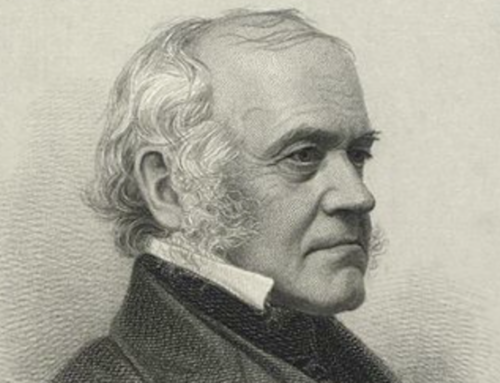Missed the Boat’s production of “Moonshine Abbey” was a delight because of the slapstick humor and mixture of realistic and insane dialogue in which its priestly writer specializes. It was powerful because it tapped into the hopes and fears of young Catholics who want to believe in the certainty of God but are hampered by their own fears that they have, well, “missed the boat” on life, vocation, and happiness.
 No, it wasn’t the greatest production ever. I have some criticisms of the musical I saw this past November, but they are not that important. The play’s the thing, as that bald, goateed Elizabethan fellow put it.
No, it wasn’t the greatest production ever. I have some criticisms of the musical I saw this past November, but they are not that important. The play’s the thing, as that bald, goateed Elizabethan fellow put it.
The fact is that there we were in a big auditorium laughing uproariously, without the requirement to wear the cloth masks, whose protective value against respiratory illness is now openly admitted on CNN by medical experts to be, in Dr. Leana Wen’s words, “largely decorative” (though some people in the audience chose to wear them). The fact is that the musical itself did provide both moments of laughter and a few moments in which, well, I believe there was some dust in my eye. It was, all told, truly entertaining.
The play in question is Moonshine Abbey, originally written by a Catholic seminarian named Kyle Kowalczyk years ago for performance at the St. Paul Seminary in Minnesota. It was revived in November 2021 by Missed the Boat Theatre, a dynamic Catholic community theater organization that started two years ago—right before the pandemic began—with a dynamite show written by the by-then-Father Kyle Kowalczyk. That show, “Catholic Young Adult,” which lovingly mocked and appreciated the small but lively group of serious young American Catholics that Colleen Carroll Campbell called “the new faithful,” was the tale of a local young adults group at a Catholic parish believed to be on the chopping block by the archdiocese.[*] The young adults’ hilarious attempts to “Save the Parish” (one of the catchiest of a plethora of catchy songs in the show) were a kind of living symbol of their attempts to live their faith while the world changes and they complete their own growing up. It was a local smash hit in 2019 and gave promise to a new stream of original theater in the upper Midwest. Due to America’s—and particularly blue America’s— nearly two-year “two weeks to stop the spread” policies, the company was not able to mount another show until this past fall. But when they did, it was a doozy.
Like their first show, Missed the Boat’s production of Moonshine Abbey was a delight because of the slapstick humor and mixture of realistic and insane dialogue in which its priestly writer specializes. It was powerful because it tapped into the hopes and fears of young Catholics who want to believe in the certainty of God but are hampered by their own fears that they have, well, “missed the boat” on life, vocation, and happiness.
The plot begins with Conroy, a young man who, having flunked out of seminary and been rejected by the young woman he thought he would marry, approaches the monastery of St. Hippolytus to try out what he thinks is his last chance at finding what God wants out of him. The monastery is itself an offering basket case of vocational uncertainty. The abbot, Fr. Cyril, carries no authority with his wayward monks, who mostly do not dress like monks, talk like monks, or seem to have any impulse toward the life of prayer of monks or even ordinary Christians. One is overheard on the phone saying to a young woman, “No-o-o, you-u-u hang up!” The rule of the abbey at this point seems to have been reduced to (cue the musical number) “Semper Ubi Sub Ubi,” which those who know faux Latin will recognize as “Always wear underwear.” Monte Cassino this ain’t.
The one monastic tradition the monks do keep up is the brewing of adult beverages, which have just been made legally problematic by the passage of Prohibition. Thus, the introduction of another group of characters—the local police, led by a captain seeking to root out the demon rum-and-whiskey-and-what-have-you that seems to have never stopped circulating throughout the county. Because the original play was performed at a seminary, the number of female characters had been kept to a minimum. Given the demographics of community theater, they needed to be increased. Thus, Fr. Kowalczyk’s rewrite made the police force an all-female group, perhaps anachronistic but, with the requisite suspension of disbelief, a kind of delight. Think a cross between the Spice Girls and the Keystone Cops: Young Cop, Feminine Cop, Backwoods Cop, and Preppy Cop. They’re led by Morgan, a woman whose husband had headed the local force before his death and who seems caught between seeking advancement that would land her a position with the feds and a desire to do something else altogether. Like the male characters, she is asking questions about her vocation.
The female police officers recruit Roy, a young man who is, unknown to them, set on revenge for a long-ago slight and believes the man who committed it is in the monastery. He is to infiltrate the monastery, posing as a clerical visitor from the Vatican. Taking the name Fr. Nestorius (a bit of theological inside humor—Nestorius was a famous heretic), Roy announces his investigation and the monks, believing his story, don’t do anything to hide their liquor production. They do, however, decide to hide their dissolute spiritual state and pretend to a religious practice involving spiritual fruits rather than Fruit of the Loom.
Because of Fr. Kowalczyk’s expansion of the backstory of the women and their leader, the first half was extraordinarily long. As I said above, however, who really cared? Composer Sam Backman used amusing combinations of chant and chant-like melodies as well as swing jazz to power the musical numbers, many of which combined pathos and humor within both the music and the choreography itself.
The second half of the story, shorter blessedly, had just as much slapstick and comic invention as well as the no-problem-just-dust-in-my-eyes moments. And those revolved around those questions of vocation. What will Morgan do? What will happen to the monks pretending to be better than they are? Will Conroy finally find his vocation here in this looney abbey? Will Roy get his revenge?
I won’t spoil the show for you. Like Fr. Kowalczyk’s earlier show, “Catholic Young Adult,” this one does not simply resolve everything in such a way as to avoid pain. And it does not short-circuit the agony felt by a variety of people who really don’t know what God wants out of them. One of the most affecting songs bears the theater company’s name, “Missed the Boat,” and is sung by Conroy, who has left the abbey in the crushed state of believing that, as with the priesthood and marriage, he has no place with the monks either. It is extraordinarily comic and sad at the same time.
The middle-aged Morgan, too, has a similar number asking where she should go. This is why I call this show theater for the ages. It is about the struggle all ages feel, particularly in a time such as now when the very ideas of vocation and stability may be embraced by Christians but are hard to achieve when an entire culture goes against them. And even when we think we are stable and settled, even doing God’s will, the passage of time often reveals to us that we do not know where we should be or, if we know that, what we should be doing. The aphorist Rochefoucauld observed, “We arrive as newcomers to the various stages of life, and we often lack sufficient experience in spite of the number of our years.”
Fr. Kowalczyk’s plays for Missed the Boat Theater, of which I hope to see many more, are all about such crises. They catalogue both the pathos and the absurdity of Catholic, Christian, and human existence. But they also point the way forward to the transcendent destiny to which we sometimes sad and absurd creatures are called—even when we are newcomers to a next stage of life and feel as if we have missed the boat.
The Imaginative Conservative applies the principle of appreciation to the discussion of culture and politics—we approach dialogue with magnanimity rather than with mere civility. Will you help us remain a refreshing oasis in the increasingly contentious arena of modern discourse? Please consider donating now.
[*] For a bit about that show and another, see my article “New Life in Catholic Theater: Catholic Young Adult and Lolek,” Catholic World Report, November 16, 2020. For the theater company, see the Missed the Boat website.
The featured image is courtesy of Missed the Boat’s website.







Leave A Comment